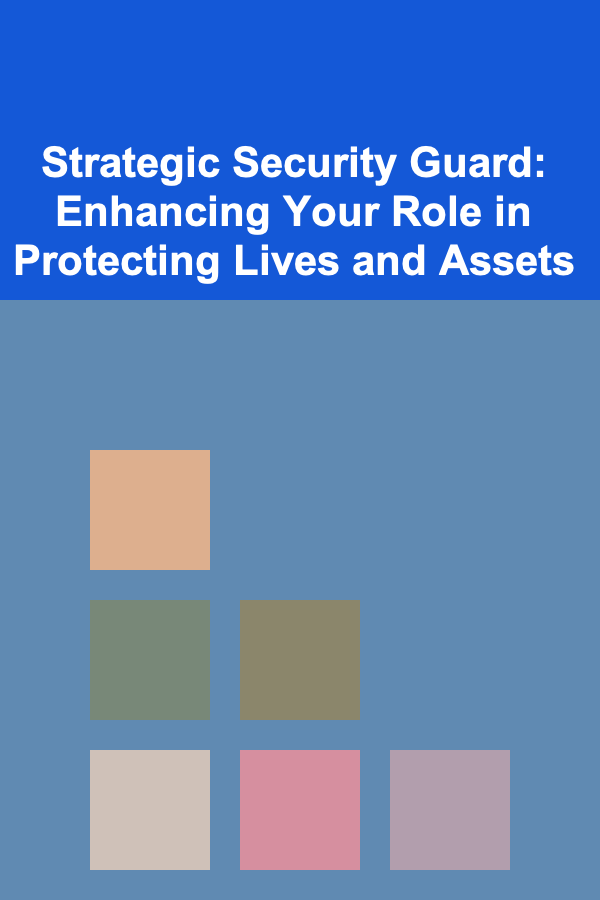
Strategic Security Guard: Enhancing Your Role in Protecting Lives and Assets
ebook include PDF & Audio bundle (Micro Guide)
$12.99$9.99
Limited Time Offer! Order within the next:

The role of a security guard has evolved significantly over the years. No longer are security guards merely tasked with monitoring buildings and patrolling perimeters. Today, they are integral players in the broader security infrastructure, contributing to the protection of lives, assets, and sensitive information across various industries. Whether in corporate environments, retail spaces, or high-risk locations, the role of a security guard requires more than vigilance---it demands strategy, adaptability, and an understanding of both physical and psychological security principles.
This actionable guide explores how security guards can enhance their effectiveness by adopting a strategic mindset. It delves into key aspects such as situational awareness, proactive security measures, communication skills, and advanced techniques that contribute to overall security in high-risk environments.
The Evolving Role of the Security Guard
The traditional view of a security guard often focused on visible deterrence: standing post, observing, and reacting when something went wrong. However, in today's complex security landscape, this approach alone is no longer sufficient. Security guards must now be skilled in preventative strategies, be adaptable to emerging threats, and work seamlessly with other security professionals and law enforcement.
A Shift from Reactive to Proactive Security
While it's essential for security guards to react swiftly in the event of a security breach, modern security measures emphasize proactive solutions. This shift is driven by advancements in technology, evolving threats, and the increasing complexity of high-risk environments.
Security guards are no longer passive observers but active participants in preventing security incidents before they happen. By leveraging situational awareness, assessing risks, and employing advanced security measures, security guards can prevent incidents and reduce vulnerabilities in a wide variety of settings.
Key Strategies for Enhancing Your Role as a Security Guard
To truly enhance your role as a security guard, it's crucial to develop a set of strategic skills and mindset shifts that go beyond basic security procedures. Below are several actionable strategies to elevate your contribution to security operations:
1. Master Situational Awareness
Situational awareness is the cornerstone of effective security. A security guard's ability to perceive, comprehend, and predict events in their environment can mean the difference between stopping an incident and responding to one after it has escalated.
How to Develop Situational Awareness:
- Scan and Observe Regularly: Instead of passively watching a single location, actively scan your environment, both in the immediate vicinity and at a distance. Look for unusual behavior, unattended bags, suspicious vehicles, or individuals who are out of place.
- Know the Layout: Familiarize yourself with the physical layout of the area you're assigned to protect. This includes entrances, exits, hidden corners, and vulnerable points. A deep understanding of the physical space helps you identify potential security weak spots.
- Understand the Pattern of Behavior: Recognize patterns of activity within your environment. For example, in retail environments, you may begin to identify customer behavior that indicates theft or fraud. In corporate settings, you might spot signs of espionage or corporate sabotage.
- Use Technology: Equip yourself with tools such as security cameras, sensors, and alarms to help you monitor spaces more effectively. Many modern security systems provide alerts or feeds that can help you detect anomalies in real-time.
2. Embrace Technology to Improve Efficiency
Modern security guards have a wealth of technological tools at their disposal, including surveillance cameras, motion sensors, drones, and integrated security systems. Understanding how to leverage these technologies effectively can significantly enhance your ability to protect lives and assets.
Actionable Steps to Integrate Technology:
- Learn to Operate Security Systems: Familiarize yourself with the various technologies used in your workplace. This could range from surveillance systems to alarm monitoring software. A well-informed security guard can intervene more effectively if they understand how these systems work.
- Utilize Access Control Systems: In high-security environments, access control systems are crucial in preventing unauthorized individuals from entering restricted areas. Learn how to operate key card systems, biometric access controls, or RFID technology.
- Participate in Cybersecurity Awareness: While cybersecurity may seem like a separate field, many physical security incidents have digital components. For example, security guards may need to help with verifying the identity of individuals accessing sensitive areas or monitoring digital records. Basic knowledge of cybersecurity can complement your physical security skills.
3. Develop Effective Communication Skills
Security guards are often the first point of contact in emergency situations. Whether you're responding to a security breach or helping with a lost child, effective communication can help de-escalate situations and convey important information quickly.
Key Communication Techniques:
- Calm and Clear Communication: When facing tense situations, remain calm and clear in your communication. Speak confidently and avoid raising your voice unnecessarily. Clear communication reduces panic and helps others follow instructions.
- Active Listening: Often, the key to resolving an issue lies in understanding the problem fully. Listen carefully to those involved in the situation, whether it's a colleague, bystander, or suspect. Active listening can give you valuable information that can prevent misunderstandings and solve the issue at hand.
- Use Radio or Intercom Systems Efficiently: Learn how to use communication tools effectively in emergencies. Ensure that you know the codes and terms used in your particular security protocol to maintain clarity during high-pressure situations.
- Interpersonal Skills: Building rapport with employees, customers, or visitors can often prevent security issues from escalating. Be approachable, friendly, and willing to engage in casual conversation, as it can foster trust and create a more secure environment overall.
4. Understand and Assess Risk
A strategic security guard is skilled in risk assessment. This involves identifying vulnerabilities, evaluating potential threats, and assessing the severity of risks before they escalate into incidents.
Actionable Steps to Improve Risk Assessment:
- Conduct Regular Security Audits: Regularly assess the security measures in place and look for potential vulnerabilities. This could include checking lighting, verifying the condition of surveillance equipment, and evaluating entry points for unauthorized access.
- Use a Threat Matrix: Develop a threat matrix that assesses the likelihood and impact of various potential security risks. By categorizing these threats (such as theft, vandalism, or natural disasters), you can prioritize actions and prepare contingency plans.
- Evaluate People and Behavior: Not all threats are physical---human behavior can often be a signal of potential risk. Keep an eye out for signs of stress, agitation, or suspicious activity. Understanding body language and psychological cues can provide early warning signs of an incident.
5. Implement Preventative Security Measures
Prevention is always better than reaction. By establishing preventative security measures, security guards can minimize the risk of incidents before they even arise.
Key Preventative Strategies:
- Access Control and Surveillance: Ensure that all entry points are monitored and secured at all times. Restrict access to sensitive areas and use surveillance cameras to monitor high-risk zones. Lock doors and gates after hours to ensure that unauthorized individuals cannot gain entry.
- Routine Patrols and Inspections: Schedule regular patrols in key areas and carry out checks on equipment, doors, windows, and fire exits. A consistent patrol routine ensures that security breaches are detected early.
- Incident Reporting and Documentation: Maintain accurate logs of all incidents, no matter how minor they may seem. Proper documentation can help identify trends and improve security measures over time. Additionally, reports can be valuable in the event of an investigation.
6. Stay Prepared for Emergency Response
Effective emergency response is a crucial aspect of security work. Whether dealing with a medical emergency, a fire, or a violent confrontation, being prepared can save lives.
Key Elements of Effective Emergency Response:
- First Aid and CPR Training: Many security guards are required to be trained in first aid and CPR. In an emergency, quick medical intervention can prevent further injury or loss of life.
- Evacuation Procedures: Be familiar with evacuation plans for your location. This includes knowing how to guide people safely out of buildings, how to manage crowd control, and where emergency exits are located.
- Crisis Management: Learn how to manage crises effectively by staying calm under pressure, communicating clearly, and organizing your response to minimize harm. Understand the chain of command and work efficiently with other emergency responders.
Conclusion: The Strategic Security Guard
The role of a security guard has evolved from a simple monitoring position to one that requires strategic thinking, advanced skills, and a proactive mindset. By enhancing your situational awareness, adopting modern technology, improving communication skills, assessing risks, and preparing for emergencies, you can provide a more effective and strategic contribution to the security of any environment.
As security threats become increasingly complex and varied, so too must the role of the security guard. By embracing the principles outlined in this guide, you will not only enhance your ability to protect lives and assets but also become an indispensable part of the overall security infrastructure in any organization.

10 Clever Tips for Saving Money on Pet Food and Supplies
Read More
How to Decorate Your Fireplace Mantel for the Perfect Holiday Look
Read More
How to Prevent Break-ins with Effective Outdoor Lighting
Read More
How to Soundproof a Basement for a Peaceful Environment
Read More
How to Start a Successful Real Estate Agent Career from Scratch
Read More
How to Use LinkedIn to Find Remote Job Opportunities
Read MoreOther Products

10 Clever Tips for Saving Money on Pet Food and Supplies
Read More
How to Decorate Your Fireplace Mantel for the Perfect Holiday Look
Read More
How to Prevent Break-ins with Effective Outdoor Lighting
Read More
How to Soundproof a Basement for a Peaceful Environment
Read More
How to Start a Successful Real Estate Agent Career from Scratch
Read More